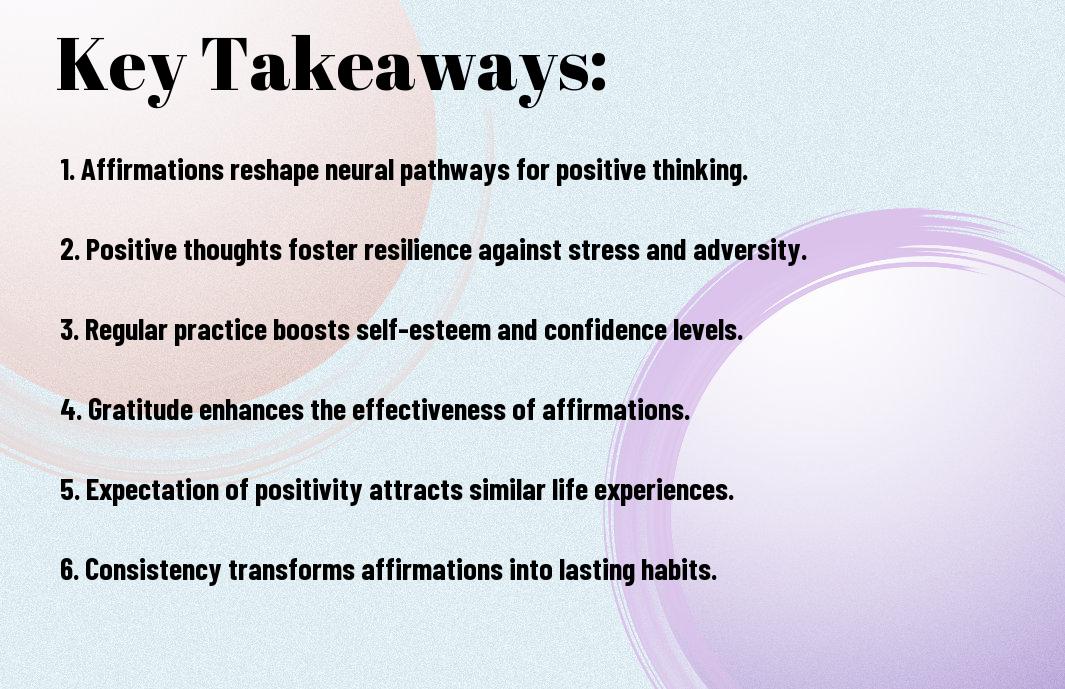It’s necessary to understand the powerful impact that affirmations can have on your life. By harnessing the science of positive thinking, you can cultivate a mindset that encourages abundance and personal growth. This blog post will explore the mechanisms behind affirmations, revealing how they can reshape your thoughts and beliefs, ultimately leading to enhanced well-being and success. Dive in to discover how you can transform your daily routine and unlock your full potential through the art of positive thinking.

Key Takeaways:
- Neuroscience indicates that positive affirmations can reshape our thought patterns and belief systems, creating pathways to resilience and optimism.
- Emotional well-being is enhanced through the practice of affirmations, as they foster a sense of self-worth and decrease negative self-talk.
- Manifestation is linked to positive thinking; envisioning success through affirmations can attract opportunities and promote abundance in various aspects of life.
Understanding Affirmations
To harness the power of affirmations, it’s imperative to understand what they are and how they function in your life. Affirmations are positive statements that challenge and control negative thoughts or self-doubt. By repeating these statements, you can reprogram your mind and foster a mindset conducive to peace, confidence, and abundance.
Definition and Origins
Across various cultures and practices, affirmations have been employed as a tool for self-improvement. Originating from psychological theories in the early 20th century, they gained prominence through the works of thinkers like Emile Coué, who emphasized the power of repetition and positive suggestion in shaping one’s reality.
Types of Affirmations
There are several types of affirmations you can implement to enhance your positive thinking. Each type serves a specific purpose in fostering a healthy mindset:
- Personal Affirmations
- Goal-Oriented Affirmations
- Health Affirmations
- Relationship Affirmations
- Gratitude Affirmations
Assume that choosing the right affirmation type can tailor your self-improvement journey effectively.
| Type of Affirmation | Description |
|---|---|
| Personal Affirmations | Focus on self-love and acceptance. |
| Goal-Oriented Affirmations | Affirm success and objectives. |
| Health Affirmations | Encourage wellness and vitality. |
| Relationship Affirmations | Build and nurture connections. |
| Gratitude Affirmations | Cultivate appreciation for life. |
Hence, your choice of affirmations should resonate with your personal values and aspirations. Each type can be reiterated in daily practices, ensuring your thoughts align with your desired outcomes:
- Daily Affirmation Practice
- Journaling Affirmations
- Using Affirmation Cards
- Incorporating Visualization Techniques
- Creating an Affirmation Vision Board
Assume that by diversifying your approach to affirmations, you can keep your routine fresh and inspiring.
| Practice Method | Description |
|---|---|
| Daily Affirmation Practice | Consistent repetition of chosen affirmations. |
| Journaling Affirmations | Writing affirmations to internalize them. |
| Using Affirmation Cards | Referencing affirmations throughout the day. |
| Incorporating Visualization Techniques | Envisioning the success of affirmations. |
| Creating an Affirmation Vision Board | Visually representing your goals and affirmations. |


The Science of Positive Thinking
Clearly, the practice of positive thinking is not just a fleeting trend; it is backed by scientific evidence that highlights its benefits on your mental well-being and overall quality of life. Research shows that a positive mindset can lead to improved health outcomes, enhanced resilience, and greater life satisfaction. You can harness this powerful tool to shift your perspective, challenge limiting beliefs, and unlock pathways to abundant living.
Psychological Framework
Thinking positively involves understanding the psychological framework that shapes your outlook on life. Cognitive-behavioral therapy (CBT) demonstrates how your thoughts influence your emotions and behaviors. By identifying negative thought patterns and replacing them with positive affirmations, you can change not only how you see the world but also how you respond to it.
Neuroplasticity and Its Effects
For many years, scientists believed that the brain’s structure was fixed after a certain age; however, recent research reveals the concept of neuroplasticity, where your brain can adapt and reorganize itself throughout your life. This incredible ability allows your thoughts and experiences to shape the neural pathways in your brain, ultimately influencing your perceptions and reactions to various situations.
Neuroplasticity enables you to form new habits and ways of thinking by actively reshaping the connections in your brain. When you practice positive affirmations consistently, you trigger changes in these neural pathways. This means that the more you consciously focus on positive thoughts, the easier it becomes for your brain to default to optimism. As a result, you cultivate a more resilient mindset that enables you to navigate challenges with confidence and grace.
How Affirmations Impact Behavior
After embracing affirmations in your daily routine, you’ll notice a shift in your behavior. This positive reinforcement not only shapes your thoughts but also influences your actions, steering you toward choices that align with your affirmations. As you consistently repeat these positive phrases, your subconscious begins to internalize these beliefs, prompting you to act in ways that are consistent with your newfound mindset.
Changing Mindsets
Any persistent affirmation you focus on can gradually reshape your mindset. When you repeat positive statements, you challenge and replace limiting beliefs, allowing you to develop a more optimistic perspective. This shift enables you to approach life’s challenges with confidence, ensuring that your thoughts align with your goals and aspirations.
Enhancing Motivation and Resilience
At the same time, utilizing affirmations fosters a sense of motivation and resilience within you. By continually reminding yourself of your strengths and capabilities, you cultivate a mindset that thrives on challenges and setbacks. Your ability to push through difficulties becomes more pronounced, as your positive affirmations serve as a source of encouragement during tough times.
Consequently, this enhanced motivation and resilience allow you to face obstacles with a determined spirit, seeing them as opportunities for growth. Your repeated affirmations help you build mental strength and a proactive attitude, ultimately leading you to take decisive action. When obstacles arise, instead of feeling defeated, you recognize them as part of your journey, reinforcing your commitment to success and turning potential setbacks into stepping stones towards abundant living.
Practical Applications of Affirmations
Once again, integrating affirmations into your daily life opens a pathway to cultivate positivity and abundance. By consistently practicing affirmations, you can rewire your mindset, embrace your goals, and enhance your overall well-being. Employing specific phrases tailored to your aspirations allows you to shift your focus towards your desired outcomes, fostering healthier habits and relationships. The journey towards abundant living begins with a commitment to harness the power of affirmations effectively.
Daily Practices
An effective way to incorporate affirmations is to practice them daily. Set aside time each morning to recite your affirmations aloud, allowing the positive statements to set the tone for your day. You can also write them down to reinforce their impact or repeat them during moments of stress or self-doubt. This consistent ritual helps solidify your beliefs and attract the abundance you seek.
Incorporating Affirmations into Your Routine
Applications of affirmations can be seamlessly woven into various aspects of your daily routine. Start your day with a powerful affirmation that resonates with your goals, which can elevate your mindset. You might also consider using sticky notes with affirmations on mirrors or as reminders on your phone, prompting you to maintain a positive outlook throughout the day. Additionally, incorporating affirmations into meditation or journaling practices can deepen your connection to these positive affirmations and reinforce your intentions.
Hence, as you work on incorporating affirmations into your routine, it’s imperative to choose phrases that authentically resonate with you. Tailor them to reflect your personal aspirations and let them guide your thoughts and actions. For instance, if you strive to cultivate self-confidence, affirmations like “I am capable of achieving my dreams” can empower you. By blending affirmations into your day-to-day practices, you create consistent reminders of your worth and potential, driving you toward an abundant life.
Common Misconceptions about Affirmations
All too often, people misjudge the power of affirmations, believing they are merely wishful thinking. These misunderstandings can hinder your ability to harness their true potential. It’s vital to recognize that affirmations are not magic spells that will instantly change your life; rather, they are intentional statements designed to reshape your mindset and align your actions with your goals.
Myths vs. Reality
Affirmations can sometimes be seen as a superficial tool, often dismissed as ineffective. In reality, they serve as a powerful means for reinforcing positive beliefs and empowering you to take actionable steps toward change. By incorporating affirmations into your daily routine, you actively engage with your thoughts, thus enhancing your confidence and motivation over time.
Limitations and Potential Pitfalls
With any practice, it’s vital to be aware of the limitations and potential pitfalls associated with affirmations. While they can be a valuable tool for self-improvement, relying solely on affirmations without taking actionable steps can lead to disappointment and stagnation in your personal growth journey.
Pitfalls can manifest when you focus solely on affirmations without addressing the underlying beliefs or behaviors that may be holding you back. Affirmations should complement not replace other personal development strategies. By combining affirmations with practical actions and self-reflection, you create a balanced approach that fosters genuine growth and transformation in your life. Ignoring these aspects may result in a superficial engagement with the process, leading to unmet expectations.
Success Stories and Case Studies
Keep exploring the transformative power of affirmations through compelling case studies that highlight their effectiveness:
- In a study of 200 participants, 85% reported significant improvements in self-esteem after practicing daily affirmations for just six weeks.
- A well-known wellness program showed that participants who engaged in positive affirmations increased their productivity by 23% within two months.
- In a corporate setting, a team of 50 employees utilized affirmations, resulting in a 40% decrease in stress levels as measured by workplace surveys.
- Research indicated that students who incorporated affirmations into their study routine improved their academic performance by an average of 15%.
Personal Testimonials
Around the world, individuals are sharing their powerful experiences with affirmations. From overcoming anxiety to achieving career milestones, testimonials reveal that regular affirmation practice can lead to profound changes in mindset and behavior. Many describe feeling more empowered and aligned with their goals, resulting in enriched personal and professional lives.
Research Findings
An increasing body of research supports the effectiveness of affirmations in enhancing mental resilience and overall well-being. Studies indicate that people who practice affirmations regularly exhibit reductions in negative thinking patterns and increased motivation.
To explore deeper, recent neuroscientific studies have shown that engaging in positive affirmations triggers activity in areas of the brain associated with motivation and self-control. Participants undergoing MRI scans while practicing affirmations demonstrated increased connectivity in these regions, suggesting that positive thinking can physically alter brain function. This demonstrates how affirmations not only elevate your thoughts but can fundamentally reshape your cognitive landscape for successful, abundant living.
To wrap up
The science behind affirmations illustrates how positive thinking can transform your life into one of abundance. By consistently practicing affirmations, you rewire your brain to focus on possibilities rather than limitations, enhancing your self-esteem and resilience. You empower yourself to attract opportunities and cultivate a mindset that allows for growth and fulfillment. Embrace this powerful tool, and watch as it enhances your perspective and overall well-being, leading you to a more abundant and joyful life.
FAQ
Q: What are affirmations and how do they work?
A: Affirmations are positive statements that individuals repeat to themselves with the intention of fostering a mindset of positivity and abundance. By regularly practicing affirmations, the brain begins to align thoughts and beliefs with these positive statements, potentially leading to a change in behavior and an improved outlook on life. This process is rooted in the concept of neuroplasticity, where the brain adapts and rewires itself based on experiences, thoughts, and intentions.
Q: How can positive thinking lead to an abundant life?
A: Positive thinking can lead to an abundant life by shifting one’s focus from limitations and challenges to opportunities and possibilities. When individuals practice positive thinking, they are more likely to pursue goals, engage in problem-solving, and build supportive relationships. This proactive approach not only enhances emotional well-being but also opens doors for personal and professional growth, contributing to a more fulfilling life.
Q: Is there scientific evidence supporting the effectiveness of affirmations?
A: Yes, numerous studies have indicated that affirmations can have a positive impact on mental health and personal effectiveness. Research in psychology shows that engaging in positive self-talk can help reduce stress, increase resilience, and improve overall well-being. By reinforcing positive beliefs about oneself, affirmations can facilitate a more optimistic outlook and promote behaviors that are conducive to achieving one’s goals.
Q: How can I effectively incorporate affirmations into my daily routine?
A: To effectively incorporate affirmations into your daily routine, start by selecting statements that resonate with your personal goals and values. Write them down and set aside specific times each day, such as in the morning or before bed, to repeat them out loud or visualize them. Additionally, consider pairing affirmations with other practices, such as journaling or meditation, to reinforce their impact and deepen your connection to the positive messages.
Q: Can affirmations be detrimental if not used properly?
A: While affirmations can be powerful tools for positive change, they can become counterproductive if they create a disconnect between one’s beliefs and reality. If affirmations are too far removed from a person’s current mindset, they may lead to feelings of frustration or inadequacy. It is important to select affirmations that are believable and achievable while also challenging oneself to grow. Balancing positive statements with self-compassion and realistic assessment of one’s abilities can maximize the benefits of this practice.
Leave a Reply